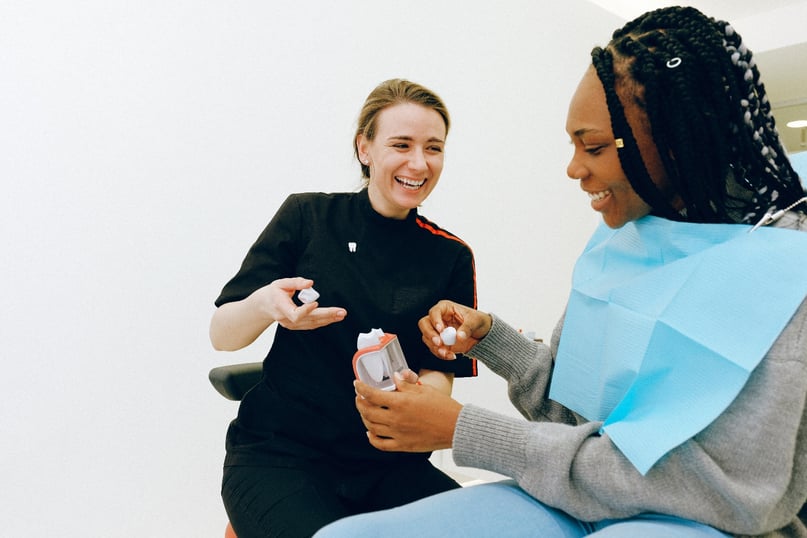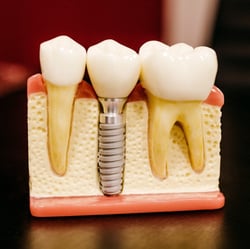
Whether you are considering having a dental implant as a tooth replacement option or you have had your dental implant for some time, a common question that I hear from my patients is regarding an old habit... Smoking!
Nearly one quarter of the U.S. population smokes cigarettes. Although the number of smokers is significantly less than it was 50 years ago, the question still comes up from a large portion of my patients.
As you know, both cigarettes and smokeless chewing tobacco carry nicotine, which the body absorbs and causes a stimulating response. This is the reason many people may feel a slight “buzz” or are more engaged with daily activity when they start using tobacco—and it is addicting.
However, smoking and tobacco have a significant impact on our teeth. Not to mention the harm it causes to dental implants.
Smoking causes certain responses in your body, and these responses will affect your oral health and dental implant. As always, the best option for any bad habit is to kick it, but there are some alternatives that will give your dental implant the best chance of success should you choose to continue smoking.
How does smoking affect my dental implant?
Did you know tobacco causes changes to your blood flow? It reduces the amount of oxygen delivered to your bone and gums. Lower levels of oxygen reduce the body’s ability to heal or create strong bone around the dental implant.
Tobacco also weakens the body’s immune response to pathogens, leading to issues like gum disease and tooth loss. These pathogens also can affect a dental implant, cause lower success rates in smokers and a higher chance of complications for those who have implants
What is needed for a successful dental implant?
Oxygen, a strong immune system, and daily care are essential for a successful dental implant!
Let us consider plants as a means of comparison. To have a thriving and healthy plant, it requires a healthy foundation of soil with rich nutrients, adequate source of oxygen, daily sunshine and maintenance.

Believe it or not dental implants are remarkably similar. The foundation of your dental implant is within your bone and gums. Your bone has cells that provide nutrients and oxygen for the dental implant and this is especially important for your body to accept the implant. Pathogens and bacteria may hide out within your gums, but your immune system and daily brushing help resist these bugs.
Now… how to quit?
Smoking cessation is always recommended if you are looking for a higher quality of life. Many patients are surprised by how much better they feel about themselves, how they can taste their food again, and exercise without difficulty breathing. This includes a better prognosis of your dental implant because quitting extends the life of the investment made in your dental implants.
A free and self-guided smoking cessation method is to gradually delay your cigarette usage. For most, the first cigarette is when you wake up. Try delaying that first cigarette by one hour for the first week. Then, gradually delay this time as the weeks follow.
Over time, you are weaning your body from the nicotine. Try replacing the time smoking with new, positive habits in the morning, such as reading or exercising to keep your mind busy. Your health is well worth the dedication!
“So, I’m just not ready to quit… what are the other options?”
While not a long-term solution, for those who decide they are not able to quit during the healing process, there are some ways to improve your body’s health temporarily.
Scientific studies suggest patients should quit smoking for two weeks before implant surgery. This will aid in clearing the nicotine from your system. This also allows improved blood flow and oxygen to your bones.
Following the implant surgery, discontinue smoking for an additional eight weeks to allow bone cells to accept the dental implant and improve your immune system’s ability to fight off pathogens.
With these measures, we hope that your dental implant will be able to serve you for years to come!
For my patients who continue to smoke, I discuss these risks with them and answer any questions they may have. You might be asked to sign a consent form stating that you understand what the risks of smoking and implants.
Are Dental Implants Right for You?
Dental implants are the longest lasting tooth replacement option available for most cases. Dental implants are life changing and by working with a dental implant expert, you can have the confidence to make the best decision about your oral health.
And, though smoking has been shown to cause more complications with dental implants, they are still a viable option for many people and function for many years. The best place to start is to find a dental implant expert near you to design a treatment plan customized just for you. The AAID is glad to help guide you in your implant journey!
This blog post was written by Ryan Rodriguez, DDS of Conroe & Montgomery Comprehensive Dental Centers in Conroe & Montgomery, TX.
Dr. Rodriguez obtained his Doctor of Dental Surgery from UT School of Dentistry at Houston, where he was accepted into the Prosthodontic Honors selective. He later was awarded the “Hanau Best of the Best: Excellence in Prosthodontics” award for exceptional clinical performance. Dr. Rodriguez is a member of the American Academy of Implant and he is passionate about pursuing additional training that will provide the most effective treatment for his patients. His mission as a dentist is to provide high-quality care for his patients in a comfortable and compassionate manner. He values honesty, trust, and building relationships with each of his patients. Dr. Rodriguez is committed to creating personalized solutions to help his patients live happier and healthier lives.
![]() What are those letters after the dentist’s name? Find out what they mean.
What are those letters after the dentist’s name? Find out what they mean.





